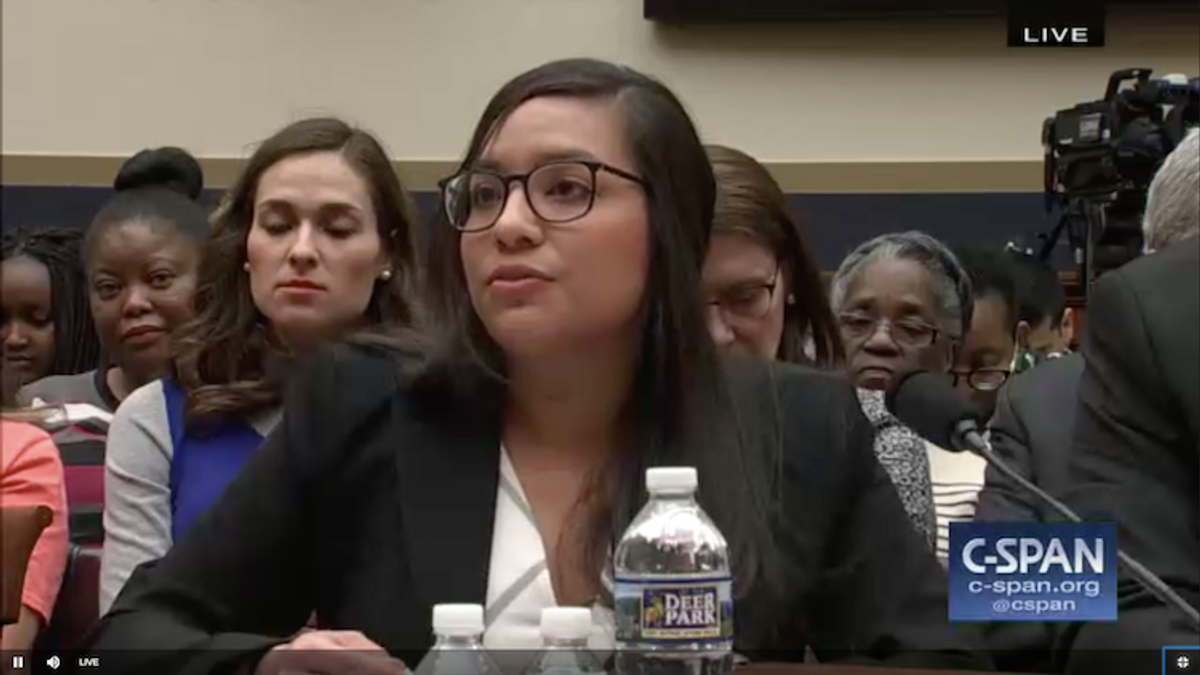When President Obama announced protections for immigrants brought to the U.S. as children, it gave Yazmin Irazoqui-Ruiz the ability to live here freely. Now, the queer medical student says President Trump could take that all away.
"When Donald Trump killed DACA, my mental health was tenuous," she said this morning, while testifying to the House Judiciary Committee. "Here I am once again, having worked hard in medical school, now facing the reality of my future as a physician being pulled out from under me."
Irazoqui-Ruiz, a volunteer with United We Dream, is one of nearly 700,000 active recipients of the Deferred Action for Childhood Arrivals program put in place by the Obama Administration in 2012.
But Trump announced his own plans to strip DACA protections away in September 2017. Today's Judiciary Committee hearing was the first time Congress has responded to Trump's proposal to kill DACA, which judges put on hold.
Irazoqui-Ruiz spoke not only of her own experience, but of the value immigrants bring to America. A medical student studying obstetrics, she works with immigrants crossing the border. It's good to have a native Spanish speaker aiding pregnant women, but also to have someone from an immigrant culture.
"Many of these women have cultural aspects that affect their health care," she testified. "I intimately understand those aspects."
As a member of the LGBTQ community, she also stressed the particular threat posed by Trump's actions for queer immigrants. She's one of 36,000 LGBTQ undocumented individuals benefitting from DACA, according to the Williams Institute at the University of California, Los Angeles.
Irazoqui-Ruiz has also volunteered with New Mexico Dream Team, where she visited Immigration and Customs Enforcement detention centers run by CoreCivic, a company that manages private prisons. There, the group investigated mistreatment of trans women and queer men who reported being abused by guards.
The tents and cells where women and children are being held in detention along the border bring back memories of "[Sheriff Joe] Arpaio's Arizona tent cities," she testified, "and it shakes me to my core."
The activist grew up in Arizona, and didn't know her undocumented status until she was 16 and her mother had a stroke. Her mother survived, but the family found themselves then fearful of the then-powerful sheriff or ICE rounding them up and deporting them.
She shared the story of her mother bringing her and her twin sister to the United States in hopes of delivering the American dream.
"In my eyes, my mother and all immigrant parents have made great sacrifices and taken risks so that their children can thrive," she said. "They are the original dreamers."
DACA protections gave Irazoqui-Ruiz the ability to move freely around the U.S. She's a third-year student now at the University of New Mexico. She fears what stripping DACA protections would mean for herself, but she doesn't appreciate discussions in Congress about offering protections to DREAMers in exchange for rigid deportation policies otherwise.
"I know some say young people with DACA should be protected with a price," she said. "They call for more immigration enforcment, which would put my mother in danger in exchange for my safety."
Watch the hearing here.













































































Fans thirsting over Chris Colfer's sexy new muscles for Coachella